What Is a Heat Wave – and How Should You Prepare for One?
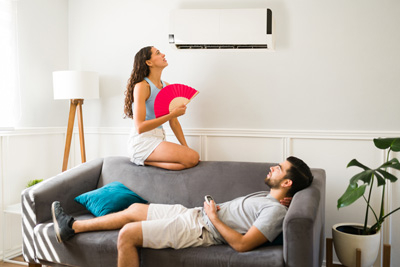
We’ve all experienced hot weather at one time or another, but sometimes the weather can become so unusually, inescapably hot for so long that it’s declared a heat wave. Heat waves are not only uncomfortable, they can be dangerous – and you should take special precautions to protect yourself and your neighbors when a heat wave strikes.
What Are Heat Waves?
The technical definition of a “heat wave” can vary from one place to another, but in the U.S., the National Oceanic and Atmospheric Administration (NOAA) defines a heat wave as “a period of abnormally and uncomfortably hot and unusually humid weather” that typically lasts two days or more.
It should be noted that there is no universal heat wave temperature; for temperatures to be “abnormal” or “unusual,” they just need to be substantially higher than the historical averages for that time and place. So conditions that qualify as a heat wave in a mild climate may not be considered a heat wave in a hot climate.
What Causes a Heat Wave?
Because heat waves are defined simply by extreme heat over a period of time, they can be caused by a range of weather phenomena. But most heat waves are the result of hot air being trapped in one area due to atmospheric conditions like high pressure systems. A high pressure system generates downward atmospheric pressure that traps stagnant air close to the surface. If that mass of air can’t find a nearby low pressure system to flow to, it can just sit in place, getting hotter and hotter until conditions change.
Heat waves are increasing in frequency, duration and magnitude due to climate change. According to the World Health Organization, the number of people exposed to heat waves increased by approximately 125 million between 2000 and 2016. Data collected by the Environmental Protection Agency shows that heat waves have been worsening steadily since the 1960s, particularly in terms of heat wave frequency and the length of heat wave season.
How to Treat and Prevent Heatstroke and Other Heat-Related Illnesses
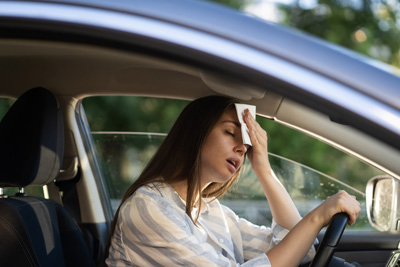
Your body cools itself naturally through perspiration, but this self-cooling process is less effective in hot and humid weather. Excessive perspiration can lead to dehydration, which can cause your body temperature to rise even further. If you experience high body temperatures for an extended period of time, you may develop a heat-related illness like heatstroke.
Heatstroke is characterized by symptoms like throbbing headaches, confusion, nausea, dizziness and a rapid and strong pulse. Fainting, loss of consciousness and body temperatures of 103° or warmer may also indicate heatstroke.
If someone is exhibiting symptoms of heatstroke, you should call 911 or transport them to a hospital right away, as heatstroke can be fatal. Use cool air, damp cloths or cool baths to reduce body temperature, but do not give fluids. If the heat index is in the high 90s or higher, do not use fans to circulate hot air around the heat-stricken person, as this can make them hotter.
During a heat wave, people may also experience less severe illnesses like heat exhaustion, characterized by heavy sweating, weakness, fast pulse, dizziness, cramping and nausea, or heat cramps, in which muscles tighten or spasm. People experiencing these symptoms should be moved to a cool area and offered sips of water, cool cloths and cool baths.
The number of heat-related illnesses during a heat wave can be reduced through cautious, preventative behaviors. Reduce or eliminate outdoor activity until the coolest time of the day. Wear light, loose-fitting clothing and avoid direct sunlight as much as possible. When strenuous or outdoor activity cannot be avoided, take frequent breaks in the shade and drink plenty of cool liquids.
If you do not have an air conditioned space at home, use cool cloths, cool baths and fans to stay cool, or consider spending time in a public air conditioned space such as a library or shopping center.
Heat Wave Safety Tips
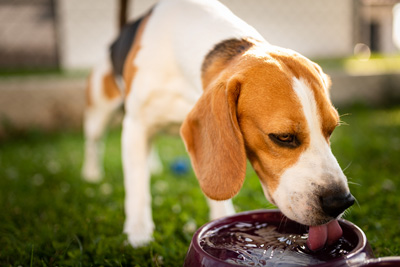
In addition to the preventative measures described above, there are other things you can do to prepare for a heat wave and cool your body down:
- Keep blinds, shades and curtains closed to block out solar heat.
- Avoid using your oven or other heat-generating appliances, especially in spaces without air conditioning.
- Use sunscreen whenever you have to be outdoors. This is good advice for all sunny days, but it’s especially important to avoid sunburns during a heat wave, as they can make you feel even hotter.
- Be mindful of the temperature in your car. During a heat wave, the temperature inside a parked car can become scorching. You should never leave any person or living thing inside a parked car during these conditions, but you should also take precautions to avoid burns from touching hot surfaces. You may need to start your car and leave the doors open for a few minutes to cool it down before you can safely enter. Use windshield screens if possible, and do not leave vulnerable items inside your car.
- Check on neighbors and loved ones who may be especially susceptible to the heat, including older adults, pregnant women and families with small children.
- Modify your pet care routine if necessary to ensure pets are in shaded, ventilated and preferably air conditioned areas at all times. Provide plenty of water, as pets may drink more during a heat wave.
- Make sleeping more comfortable with tricks like putting your sheets in the refrigerator until bedtime, or spraying your sheets with a light mist of cold water while using a fan to circulate the air.
When you see heat wave warnings or forecasts, take them seriously! They can be hazardous, but with the proper precautions, you can wait them out safely.
If you’re looking for ways to feel cooler at home while using less energy, you might want to invest in some home improvements. Our guide to weatherizing your home for summer offers advice for making your home more energy efficient, especially when it comes to your cooling equipment. For ways to save money, we've put together tips to help you lower your electricity bill in the summer.
Looking for Something Specific?
Select a category to find resources for topics that interest you.
Select Category

Related Articles:

What to Do Before, During and After Power Outages
With a little knowledge and preparation, you can protect yourself, your home and your belongings during power outages of any duration.
Read Article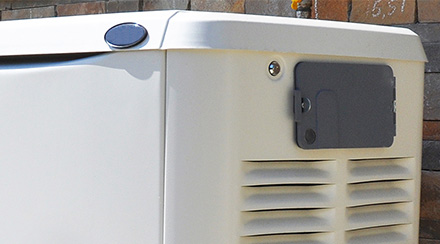
How to Choose a Generator for Your Home
Power outages can be miserable, but with the right generator, you can keep your family safe and comfortable until power is restored. Learn how to choose the best generator for your home.
Read Article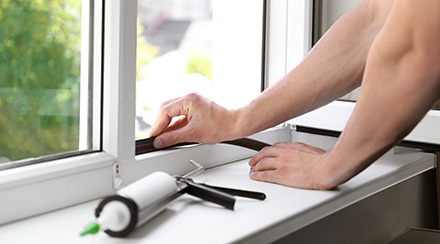
Weatherize Your Home for Summer
The extreme heat of summer can really do a number on your energy bills. But if you’re able to invest a little time and money into weatherizing to keep your home cool, you can help yourself and your family remain comfortable at home while still saving energy.
Read ArticleMost Popular Articles
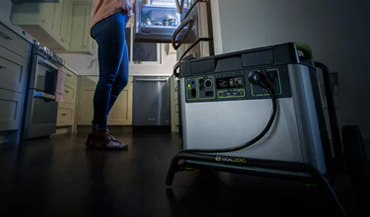
Power On the Go
GoalZero's portable and whole-home power products help you get the energy you need, whenever and wherever you need it. Learn More.
What Is a Heat Wave – and How Should You Prepare for One?
We’ve all experienced hot weather at one time or another, but sometimes the weather can become so unusually, inescapably hot for so long that it’s declared a heat wave. Heat waves are not only uncomfortable, they can be dangerous – and you should take special precautions to protect yourself and your neighbors when a heat wave strikes.
What Are Heat Waves?
The technical definition of a “heat wave” can vary from one place to another, but in the U.S., the National Oceanic and Atmospheric Administration (NOAA) defines a heat wave as “a period of abnormally and uncomfortably hot and unusually humid weather” that typically lasts two days or more.
It should be noted that there is no universal heat wave temperature; for temperatures to be “abnormal” or “unusual,” they just need to be substantially higher than the historical averages for that time and place. So conditions that qualify as a heat wave in a mild climate may not be considered a heat wave in a hot climate.
What Causes a Heat Wave?
Because heat waves are defined simply by extreme heat over a period of time, they can be caused by a range of weather phenomena. But most heat waves are the result of hot air being trapped in one area due to atmospheric conditions like high pressure systems. A high pressure system generates downward atmospheric pressure that traps stagnant air close to the surface. If that mass of air can’t find a nearby low pressure system to flow to, it can just sit in place, getting hotter and hotter until conditions change.
Heat waves are increasing in frequency, duration and magnitude due to climate change. According to the World Health Organization, the number of people exposed to heat waves increased by approximately 125 million between 2000 and 2016. Data collected by the Environmental Protection Agency shows that heat waves have been worsening steadily since the 1960s, particularly in terms of heat wave frequency and the length of heat wave season.
How to Treat and Prevent Heatstroke and Other Heat-Related Illnesses
Your body cools itself naturally through perspiration, but this self-cooling process is less effective in hot and humid weather. Excessive perspiration can lead to dehydration, which can cause your body temperature to rise even further. If you experience high body temperatures for an extended period of time, you may develop a heat-related illness like heatstroke.
Heatstroke is characterized by symptoms like throbbing headaches, confusion, nausea, dizziness and a rapid and strong pulse. Fainting, loss of consciousness and body temperatures of 103° or warmer may also indicate heatstroke.
If someone is exhibiting symptoms of heatstroke, you should call 911 or transport them to a hospital right away, as heatstroke can be fatal. Use cool air, damp cloths or cool baths to reduce body temperature, but do not give fluids. If the heat index is in the high 90s or higher, do not use fans to circulate hot air around the heat-stricken person, as this can make them hotter.
During a heat wave, people may also experience less severe illnesses like heat exhaustion, characterized by heavy sweating, weakness, fast pulse, dizziness, cramping and nausea, or heat cramps, in which muscles tighten or spasm. People experiencing these symptoms should be moved to a cool area and offered sips of water, cool cloths and cool baths.
The number of heat-related illnesses during a heat wave can be reduced through cautious, preventative behaviors. Reduce or eliminate outdoor activity until the coolest time of the day. Wear light, loose-fitting clothing and avoid direct sunlight as much as possible. When strenuous or outdoor activity cannot be avoided, take frequent breaks in the shade and drink plenty of cool liquids.
If you do not have an air conditioned space at home, use cool cloths, cool baths and fans to stay cool, or consider spending time in a public air conditioned space such as a library or shopping center.
Heat Wave Safety Tips
In addition to the preventative measures described above, there are other things you can do to prepare for a heat wave and cool your body down:
- Keep blinds, shades and curtains closed to block out solar heat.
- Avoid using your oven or other heat-generating appliances, especially in spaces without air conditioning.
- Use sunscreen whenever you have to be outdoors. This is good advice for all sunny days, but it’s especially important to avoid sunburns during a heat wave, as they can make you feel even hotter.
- Be mindful of the temperature in your car. During a heat wave, the temperature inside a parked car can become scorching. You should never leave any person or living thing inside a parked car during these conditions, but you should also take precautions to avoid burns from touching hot surfaces. You may need to start your car and leave the doors open for a few minutes to cool it down before you can safely enter. Use windshield screens if possible, and do not leave vulnerable items inside your car.
- Check on neighbors and loved ones who may be especially susceptible to the heat, including older adults, pregnant women and families with small children.
- Modify your pet care routine if necessary to ensure pets are in shaded, ventilated and preferably air conditioned areas at all times. Provide plenty of water, as pets may drink more during a heat wave.
- Make sleeping more comfortable with tricks like putting your sheets in the refrigerator until bedtime, or spraying your sheets with a light mist of cold water while using a fan to circulate the air.
When you see heat wave warnings or forecasts, take them seriously! They can be hazardous, but with the proper precautions, you can wait them out safely.
If you’re looking for ways to feel cooler at home while using less energy, you might want to invest in some home improvements. Our guide to weatherizing your home for summer offers advice for making your home more energy efficient, especially when it comes to your cooling equipment. For ways to save money, we've put together tips to help you lower your electricity bill in the summer.
Looking for Something Specific?
Select a category to find resources for topics that interest you.
Select Category

Related Articles:

What to Do Before, During and After Power Outages
With a little knowledge and preparation, you can protect yourself, your home and your belongings during power outages of any duration.
Read Article
How to Choose a Generator for Your Home
Power outages can be miserable, but with the right generator, you can keep your family safe and comfortable until power is restored. Learn how to choose the best generator for your home.
Read Article
Weatherize Your Home for Summer
The extreme heat of summer can really do a number on your energy bills. But if you’re able to invest a little time and money into weatherizing to keep your home cool, you can help yourself and your family remain comfortable at home while still saving energy.
Read ArticleMost Popular Articles

Power On the Go
GoalZero's portable and whole-home power products help you get the energy you need, whenever and wherever you need it. Learn More.







